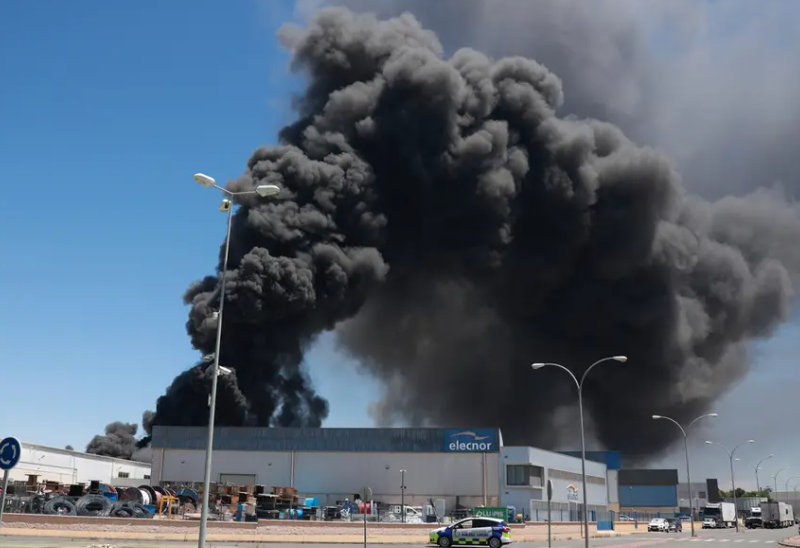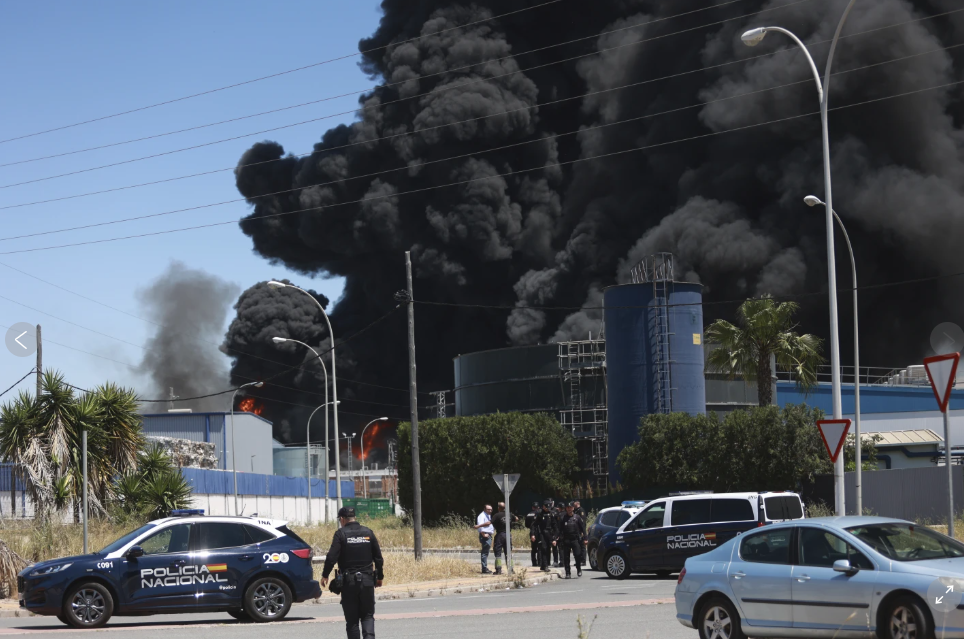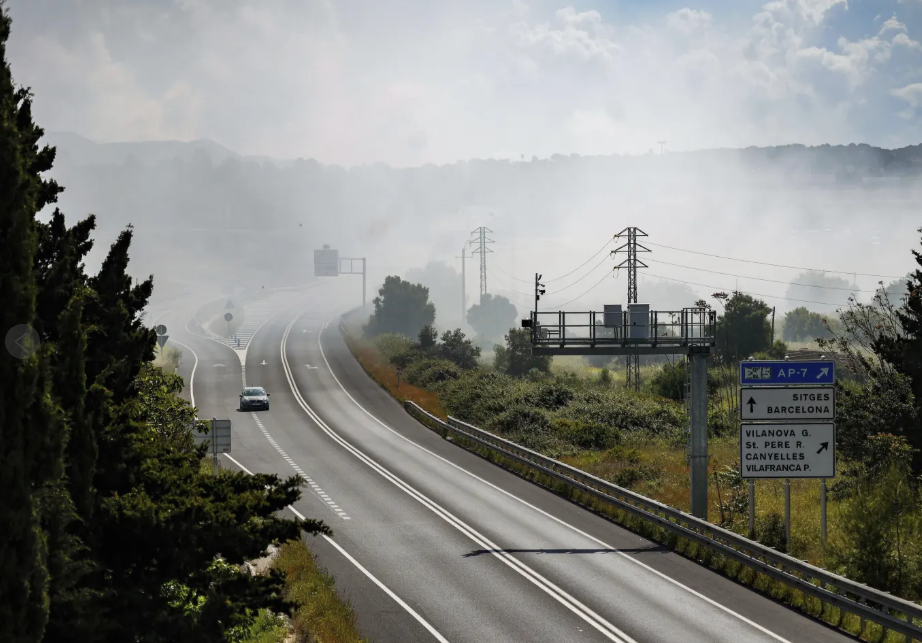An explosion at a chemical plant near Seville, Spain, triggers mass warnings for thousands amid toxic smoke concerns. Emergency protocols were activated across the region.

Explosion at Chemical Plant Near Seville: Thousands Urged to Stay Indoors
In a terrifying incident that shook southern Spain, a powerful explosion erupted at a chemical plant near Seville on May 14, 2025, prompting local authorities to issue immediate shelter-in-place warnings for thousands of residents. The blast occurred in the La Rinconada industrial zone, just 15 kilometers from the city center, triggering panic and widespread concern about air quality and chemical exposure.
What Happened?
According to Andalusian emergency services, the explosion occurred around 10:45 AM local time, followed by a large fire and a thick plume of black smoke visible from kilometers away. Initial investigations suggest the explosion originated from a storage tank containing volatile organic compounds. Fortunately, no fatalities have been reported so far, although seven workers sustained injuries, including two in critical condition.

Authorities quickly activated the Emergency Chemical Risk Plan (PLASEQTA), a regional protocol designed to manage industrial chemical accidents.
Mass Alerts and Public Warnings
Shortly after the explosion, Seville’s City Council and regional emergency agencies issued SMS alerts and radio broadcasts urging residents in nearby areas, including San José de la Rinconada and Brenes, to stay indoors, close windows, and turn off ventilation systems.
Schools in a 10-kilometer radius were instructed to suspend outdoor activities, while local traffic was diverted to keep emergency routes clear. The Seville airport, although not directly affected, reported brief disruptions due to airspace safety assessments.
Environmental and Health Concerns
The explosion has raised significant concerns about potential airborne chemical exposure, including benzene, toluene, and xylene, all known for their harmful effects when inhaled in large concentrations. Spain’s Ministry for Ecological Transition dispatched a team of environmental inspectors to monitor air quality levels in real-time.

Dr. María López, a toxicologist from the University of Seville, stated:
“Immediate exposure to these chemicals can cause respiratory irritation, headaches, and dizziness. Prolonged exposure, especially among vulnerable groups like children and the elderly, could pose more serious health risks.”
Emergency teams are using drones and mobile labs to detect volatile compounds in the air and ensure safe thresholds are maintained.
Official Response and Investigation
The chemical plant, operated by InduQuimica SA, has been temporarily shut down pending a full investigation. Company officials expressed regret and confirmed full cooperation with authorities. A spokesperson stated:
“Our priority is the safety of our employees and the community. We are working closely with emergency teams to contain the situation and determine the cause.”
Spain’s Civil Guard and Fire Brigade’s hazardous materials unit are leading the investigation, examining possible causes including mechanical failure or human error.
🔒 1. Stay Indoors
- Close all doors and windows immediately.
- Seal gaps with wet towels or duct tape to prevent smoke or gas from entering.
- Avoid going outside unless authorities say it’s safe.
🌀 2. Turn Off Ventilation Systems
- Switch off ACs, fans, and heaters that draw in air from outside.
- Use air purifiers with HEPA filters, if available.
😷 3. Use Protective Gear
- Wear a N95 mask or respirator if you must go outside.
- Avoid cloth masks; they do not filter chemical particles.
💧 4. Drink Clean Water
- Use bottled water for drinking and cooking until water safety is confirmed.
- Avoid touching or using potentially contaminated surfaces or items.
🚨 5. Follow Official Alerts
- Monitor local news, radio, or emergency apps for updates.
- Don’t rely on social media unless it’s from verified sources like local authorities or emergency services.
👩⚕️ 6. Watch for Health Symptoms
- Report symptoms like coughing, dizziness, eye irritation, or nausea to a medical professional immediately.
- Vulnerable individuals (children, elderly, people with asthma) should be monitored closely.
🧽 7. Decontaminate If Exposed
- Remove and seal contaminated clothing in a plastic bag.
- Wash exposed skin thoroughly with soap and lukewarm water.
- Avoid using alcohol-based products or strong chemicals on skin.
🚗 8. Evacuate If Ordered
- If an evacuation is ordered, do so calmly and quickly.
- Follow designated evacuation routes and bring essential items only.
🧑⚕️ 9. Get Medical Check-Ups
- Schedule a follow-up with a doctor to check for any delayed symptoms or long-term exposure effects.
Community Impact and Precautionary Measures
Local residents have expressed frustration and anxiety, with many questioning the proximity of hazardous chemical plants to residential zones. Environmental groups are calling for stricter safety audits and relocation of high-risk industrial facilities.
Meanwhile, health clinics in nearby towns have extended hours and stocked up on inhalers and protective masks as a precaution.
Final Thoughts
This incident is a stark reminder of the risks associated with industrial chemical facilities and the importance of proactive safety measures and emergency preparedness. While immediate catastrophe has been averted, the long-term health and environmental impacts remain to be seen.
Authorities urge all residents to follow official updates and avoid sharing unverified information on social media.
Stay safe. Stay informed.